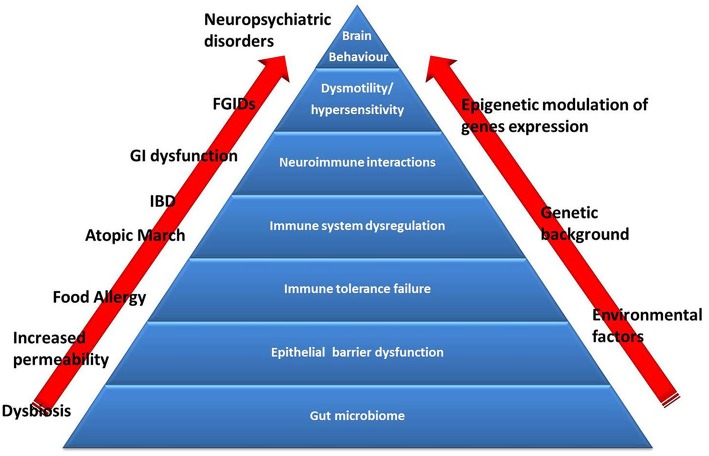Food allergies. It’s on the rise. Unfortunately, statistics in developing countries are still wanting. However, information regarding the U.S. indicates that for the past 20 years, allergies have doubled each decade. Interestingly enough, over half of children with a food allergy didn’t inherit it from a parent. So what is causing this sudden rise in allergies? And what can be done to mitigate the detrimental effects of mild to severe allergies? Let’s discuss the amazing impacts of fermented foods on allergies!
Causes Of Food Allergies
According to this study, there are several factors that contribute to either health, or food allergies.
- Food Allergy
- Genetic factors
- Environmental factors
- Antiseptic agent
- Cesarian section
- Only child
- Antibiotics and gastric acidity inhibitors
- Diet Factors
- High fat/sugar and low fiber diet
- Baby foods
- Delayed exposure to high allergenic foods
- Health
- Genetic factors
- Environmental factors
- Pets
- Large family
- Rural environment
- Diet Factors
- Maternal diet while pregnant
- Home made foods
- High fiber/healthy foods (especially for first 24 months of life)
- Fermented Foods
- Breastmilk
- Probiotics
Overall, research has found that allergies are due to a breakdown in the immune system. This breakdown decreases the ability to tolerate dietary antigens or proteins. So in order to have immune tolerance, regulatory T cells are required, among many other things. As the name suggests, regulatory T cells regulate/suppress the immune response towards self as well as anything from outside the body.
In addition, with allergies there is generally seen something called “gut dysbiosis.” This is basically where your gut microbiome is out of balance. Research is showing a high correlation to early (first 24 months of life) gut dysbiosis and the development of food allergies. Stemming from gut dysbiosis is something called the gut-brain axis. In other words, this is talking about the concept that an unhealthy gut can cause or contribute to psychiatric disorders (i.e. ASD, ADHD, OCD, etc.).
Research and Treatment of Food Allergies

The meta analysis I cited above has done a great job at pooling a wide variety of studies on the subject of food allergies, both IgE and non-IgE related. The immune system is such a vast and complex network that you can’t pinpoint just one or even a handful of things that will “fix” the problem. However, it’s still important to do due diligence and explore as many specific avenues as possible. In order to keep this article to a reasonable length, I will address specific immune issues and possible solutions in the article here.
Meta Analysis Findings
Back to the meta-analysis. The researchers pulled together 165 references for their article. They found that different types of beneficial bacteria act on specific parts of the body and immune system. Here are some amazing impacts of fermented foods on allergies which research has found stemming from the various bacteria studied:
- Intestinal lining growth (see my posts on pectin here and here for more intestinal lining information and it’s importance)
- Balancing the Th1 and Th2 immune response
- Development of Tregs (helps regulate immune system)
- Increase in T and B cells with the addition of cytokines to help regulate the immune response
- Developing tolerogenic dendritic cells which help suppress the immune system
- Subdue the IgE production
- Controls how the body expresses Th1 and Th2 genes (how it reads the DNA)
- Increase of cytokines secreted by certain cells to help regulate the immune system
- Reducing glycoproteins and IgE (responsible for stimulating the immune response)
- Reduction in allergic reactions
- Reduced anaphylactic reactions
I’m sure a lot of that sounded redundant. However, there are many “avenues” shall we say, which the body uses to regulate the immune system. There are 9-10 different bacterial strains listed beside the above mentioned health benefits in the article. They are all found in normally fermented foods such as yogurt, kefir, sauerkraut, miso, etc.
Daily Action

So what can you do on a daily basis, just regular things, to help support the immune system and get everything back into synch? This article describes the many benefits of fermented foods, but also cites that only 100 grams every day of a richly fermented food can achieve a 1010 microbial cell consumption. This is the target number shown to be sufficient in changing the gut microbiota and creating any potential health benefits.
In our family, we have fermented carrot juice and fermented beet juice in the morning, preferably 30 minutes before breakfast. This gives the probiotics ample time to line the intestines. Throughout the day we have a mixture of fermented foods in our meals.
Daily Fermented Food Ideas

- Pre-Breakfast: Fermented carrot juice and fermented beet juice
- Breakfast: Fermented dosa with avocado and fried egg, or fermented granola with homemade fermented yogurt
- Lunch: Sourdough bread sandwich (e.g. homemade mayonnaise, fermented vegetables, cheese, and meat)
- Dinner: Usually we have some variation of vegetables and meat, with a grain or seed. Most veggies are fermented, and I try to have any grain fermented, although we aren’t there consistently. Seeds are not traditionally fermented, so those I usually prepare the regular way.
- Snacks: Fermented energy balls, fermented vegetables, fresh or dehydrated fruit, hard boiled eggs, etc.
- Desserts: Occasionally we will have a dessert, but this is not a staple in our home. We primarily utilize fresh or dried fruit for our sweet tooth fix. However, I make sourdough cookies, muffins, and/or cake for special occasions. In the summer I like to make yogurt popsicles, and on my to-try list is fermented ice cream!
The 100 gram target is the equivalent of 4 ounces or 2/3 of a cup. Even if you had some fermented juice in the morning, sourdough bread at lunch, and a side of sauerkraut with dinner, you’d have plenty of fermented foods and variety to give you a diversity of beneficial bacteria and make a positive impact on your gut health. However, if that even sounds too much, just remember that a little is better than none! The amazing impacts of fermented foods on allergies can take effect within as little as 4-8 weeks! See my other articles on the history of fermenting, the best fermentation tools, and other amazing benefits of incorporating fermented foods into your diet!
Additional Resources:
- A Brief History of Fermentation and Why This is Important
- The Science Behind Fermentation and it’s Benefits
- The Importance of Time Tested Fermenting Equipment
- The Best Fermenting Equipment To Use
- Discussion on Ferments Exposed to Oxygen
- Are Mason Jars the Best Tools for Fermentation?
- Pros And Cons Of The Mason Jar For Fermenting
- Dialogue on the Mason Jar and Oxygen Diffusion
- Important Gasses In Fermentation
- The Best Salt For Fermenting: Part 1
- The Best Salt For Fermentation: Part 2
- The Best Water For Fermentation
- Pectin Effects on the Human Body
- Fermented Pectin and it’s Benefits



Leave a Reply